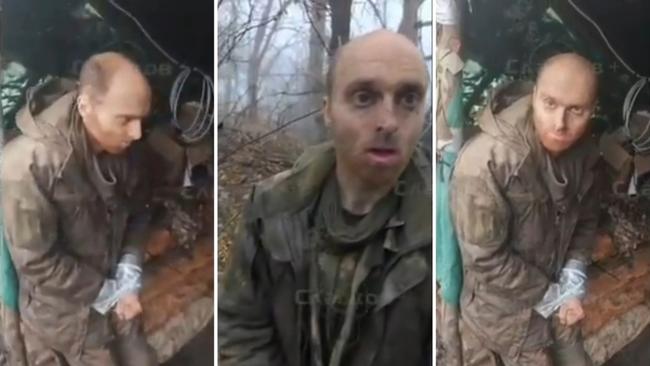Fears captured Australian soldier Oscar Jenkins has been executed by Russian forces
An Australian volunteer soldier in Ukraine is believed to have been killed after being captured by Russian forces on the frontline — the first Australian Prisoner of War to be put to death in more than 70 years.
Sources in Ukraine have told 7News the body of 32-year-old Melbourne teacher Oscar Jenkins has been found.
The Australian Government says it is making urgent enquiries, even confirming on Monday the Russian Ambassador was called in to the Department of Foreign Affairs and Trade “to seek information and reiterate Australia’s expectations that Russia will comply with its obligations under international law”.
Know the news with the 7NEWS app: Download today
If confirmed, it’s expected Canberra will react with fury over the incident.
Ukrainian authorities have been contacted and Ukraine’s Ministry of Defence is understood to be working to confirm the truth of the reports.
There is speculation that a body has been recovered but it is yet to be officially identified.
At least six Australians who’ve volunteered for the Ukraine cause have been killed since Russia’s invasion in February 2022.
But Jenkins would be the first to be captured and executed by the Russians.
He’d been serving with Ukraine’s 66th Mechanised Unit in Kramatorsk, Donetsk, when he was taken prisoner by Russian forces in December.
A week later, a video emerged of Jenkins being interrogated and repeatedly slapped in the face by a Russian captor.


“Where are you from?” the soldier asked him in Russian. “Nationality?”
When Mr Jenkins appeared unable to understand, his interrogator slapped his face, shouting: “Speak faster!”
“I’m Australian,” said Mr Jenkins.
“What are you doing here?”
When Jenkins answered that he was a soldier, he was slapped again.
“Are you **** in the head? You are a teacher!”
Jenkins is believed to be the first Australian Prisoner of War to die since the Korean War more than 70 years ago.
Australian War Memorial historian Michael Kelly says WWII veteran Horace “Slim” Madden returned to service in Korea and was captured at the Battle of Kapyong in April 1951.
He died of malnutrition and mistreatment in captivity seven months later in November 1951.
Private Madden was posthumously awarded a George Cross.
Jenkins had no military background and volunteered for war despite the Australian Government’s plea for citizens not to join Ukraine’s military efforts.


He was a graduate of the prestigious Melbourne Grammar School in 2010, before studying at Monash University where he studied biomedical sciences.
A talented cricket and football player, Jenkins played for the Toorak Prahran Cricket Club in Melbourne.
According to his LinkedIn profile, he played in the premiership winning team in 2013-14 and served as a junior coach for three seasons.
Club President Neil Gumley said Jenkins was a typical cricket-loving Australian who’d be valuable in any team.
The star payer had actually returned to Australia in February for a club reunion.
“He was in good spirits,” said Gumley.
“Oscar is a loved and talented member of the Club.”
In 2015 he moved to China and in 2017 got a job as a lecturer at Tianjin College.
It’s believed he travelled to Ukraine to volunteer last year.
Jenkins was the first known Australian soldier captured by Russian forces.


News of his arrest went viral on Russian websites, where he was paraded as a Western mercenary.
Jenkins was dressed in military gear with his hands bound and dirt smeared on his face.
He was repeatedly asked about why he was in Kramatorsk, almost 700km east of Kyiv.
“I want to help Ukraine,” he said.
The interrogation video was first shared by Alexander Sladkov, a Russian propagandist and military correspondent for Russia 1 and Russia 24 TV channels.
The Federal Government had reacted with anger over the capture, summonsing Russia’s ambassador to Australia Alexey Pavlovsky to DFAT headquarters in Canberra.
In a statement at the time, Acting Foreign Minister Mark Dreyfus said the federal government was “making representations to the Russian government” about the case.
“We urge the Russian government to fully adhere to its obligations under international humanitarian law, including with respect to prisoners of war,” Dreyfus said.
There had been hopes of a possible prisoner swap deal.
Jenkins’ mental health was said to be fragile. In one bizarre video on his personal social media pages, he raved wildly about veganism saving the world.
Military sources in Ukraine told 7News that his behaviour on the frontline in his final weeks had been “erratic” — and that he’d been complaining the war had been moving too slowly for him.
Ukraine’s Ambassador to Australia, Vasyl Myroshnychenko has praised the lost Australians as “Ukraine’s ANZACS”.
The list includes Michael O’Neill, 47, Jed Danahay, 27, Trevor Kjeldal, 40, Sage O’Donnell, 24, Digby Goldthorpe, 26, Matthew Jepson, aged in his 20s, and Joel Stremski, 21.
